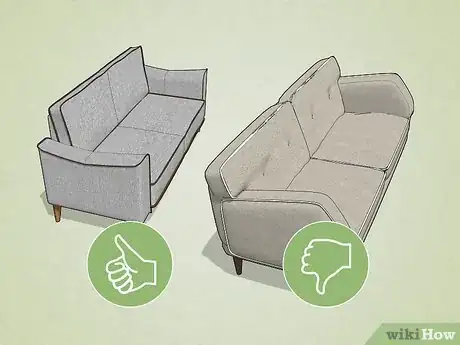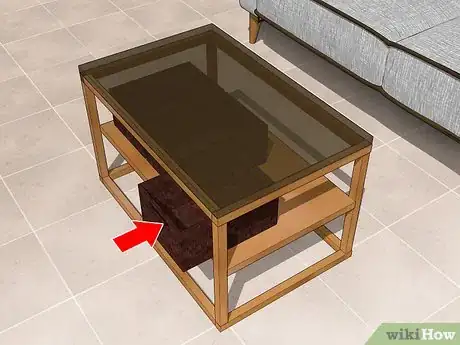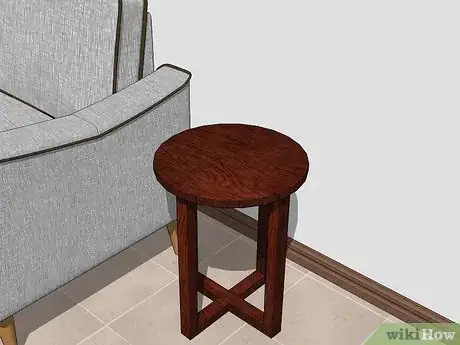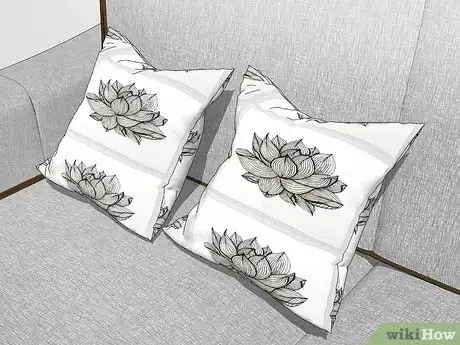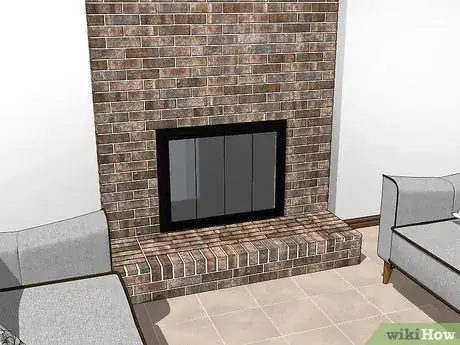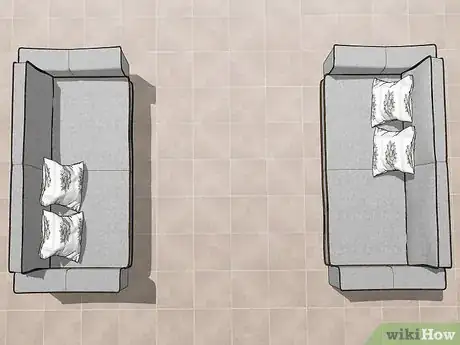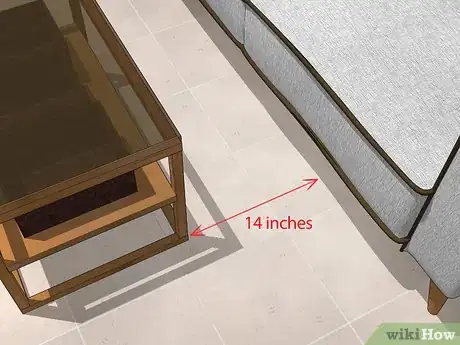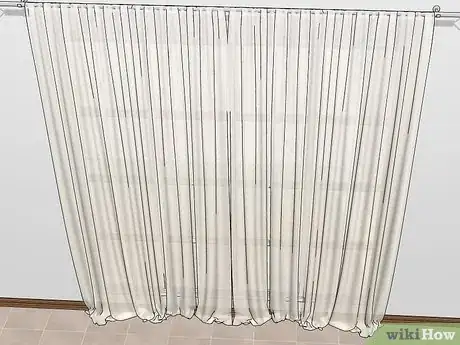This article was co-authored by Kathryn Cherne. Kathryn Cherne is an Interior Designer and the Co-Founder of Design Inside, an interior design firm in Chicago, Illinois. With over 15 years of experience, Kathryn specializes in designing, remodeling, and decorating spaces. Kathryn holds a Bachelor’s degree in Psychology from the University of Michigan and a Bachelor’s degree in Interior Design from the Harrington College of Design. Kathryn uses her background in Psychology and Interior Design to ensure her design spaces are unique, beautiful, and functional.
There are 9 references cited in this article, which can be found at the bottom of the page.
This article has been viewed 13,784 times.
The living room is the heart of many homes. Family and friends sprawl on sofas and chairs to talk, read, watch television, celebrate holidays, and build memories together. You want your living room to look its best, and be inviting and comfortable. Even if your living room room is small, with deliberate arranging of furniture, you can create a cozy, cute, and welcoming space.
Steps
Choosing Furniture
-
1Opt for slender chairs and sofas rather than large and padded ones. Avoid sofas and armchairs with large, rolled arms. These will take up space you don’t have. Slenderer designs can still be comfy. [1]
-
2Choose furniture with storage. In a tight space, having room to store your belongings can be tricky. But there are ways to keep your belongings neatly out of sight, even in a small room. Some sofas come with drawers that can pull out to store belongings. Others may have room to slide bins underneath.
- Storage cubes can make good alternatives to foot rests or coffee tables.
Advertisement -
3Consider alternatives to a coffee table. Another alternative is a small end table on one side of the sofa. Or, use two small coffee tables instead of one big one. Smaller tables will be easier to pick up and move out of the way in case you need more space.[4] An ottoman can work instead of a coffee table.[5]
- You can put a tray on top of the ottoman, to hold drinks, and then remove the tray and use the ottoman for extra seating when necessary.[6]
-
4Play with throw pillows. In a small room, you may not have space for very many items of furniture. Colorful throw pillows on the sofa can add visual interest and pops of color, and contribute to a cozy, comfortable atmosphere. Make sure your throw pillows fit the color scheme of your room.
- Make sure your sofa still has plenty of room for sitting. It’s easy to go overboard when you get excited about all the cute options for throw pillows, but don’t forget to leave room to sit!
Trying out Seating Arrangements
-
1Try positioning your seating around a focal point.[7] Pick a point where you would like people to look in your living room. If you have a built-in feature, such as a window or a fireplace, these make great focal points.[8] You can also make your own focal point out of a blank wall by hanging up a mirror, a framed poster, or a gallery wall of many framed pictures. Arrange your seating so that the focal point is within view of each seat. seat.[9]
- Play around with your furniture arrangement until you find an arrangement that feels right.
-
2Face your seating toward each other. If you don’t have a focal point you want to emphasize, then use your seating arrangement to encourage conversation.[10] Place sofa or chairs facing each other. A conversation layout can accentuate the coziness of your small living room.[11]
- The center of your conversation space does not have to be the center of the room, depending on the shape of the room.
- Anchor the center with an ottoman, coffee table, or rug.
-
3Leave room for people to move around the furniture. Allow about 30 inches between items of furniture that you need to walk around, and about 14 inches between a coffee table and a sofa. Make sure that people can enter and exit the room easily.[12]
- While it is important that people can move around your room easily, you don’t want it to feel like a hallway. An obstacle of an ottoman or coffee table will make sure that people do not stream through the room only to get to other locations.
Making your Room Feel Spacious
-
1Add mirrors to create the illusion of space.[13] A large mirror on the wall can make the room appear twice as big as it actually is. Or, you can create a gallery of framed mirrors for an interesting focal point. If your living room does not have a window, consider hanging a mirror in a window frame to create the illusion of a window. However you place your mirror, it will make your living room feel more spacious. [14]
-
2Paint the walls pale colors to brighten your room.[15] Simple white paint works very well to brighten walls. Other bright, pale colors will also work well, like pale yellow. Or, try a bright wallpaper, instead. You can wallpaper the whole room, or just one accent wall.
- For easier installation, consider peel-and-stick wallpaper, available at most home decor outlets.[16]
-
3Consider a large rug. A small rug will visually break up the floor, which could create a cramped feeling. A large rug will make the room feel more harmonious and spacious.[17]
-
4Install overhead lighting to free space. Overhead lighting will make your room feel brighter and airier. It will also free the floor from the clutter of floor lamps, saving precious space. Some options could include a flush light, recessed lights, or a hanging pendent light. [18]
- If you have a tall ceiling, consider a chandelier for a dramatic statement.
-
5Accentuate windows with flowing, gauzy curtains. If you have windows in your living room, you can draw attention to them with long curtains. Gauzy curtains will not block out the light, contributing to a spacious, airy look.
- Hang your curtain rod above the top window frame, closer to the ceiling, to create the illusion that your window is taller than it really is.[19]
Community Q&A
Did you know you can get expert answers for this article?
Unlock expert answers by supporting wikiHow
-
QuestionHow can I add more natural light to my living room?
 Kathryn CherneKathryn Cherne is an Interior Designer and the Co-Founder of Design Inside, an interior design firm in Chicago, Illinois. With over 15 years of experience, Kathryn specializes in designing, remodeling, and decorating spaces. Kathryn holds a Bachelor’s degree in Psychology from the University of Michigan and a Bachelor’s degree in Interior Design from the Harrington College of Design. Kathryn uses her background in Psychology and Interior Design to ensure her design spaces are unique, beautiful, and functional.
Kathryn CherneKathryn Cherne is an Interior Designer and the Co-Founder of Design Inside, an interior design firm in Chicago, Illinois. With over 15 years of experience, Kathryn specializes in designing, remodeling, and decorating spaces. Kathryn holds a Bachelor’s degree in Psychology from the University of Michigan and a Bachelor’s degree in Interior Design from the Harrington College of Design. Kathryn uses her background in Psychology and Interior Design to ensure her design spaces are unique, beautiful, and functional.
Interior Designer
References
- ↑ https://www.bhg.com/decorating/small-spaces/strategies/furniture-for-small-spaces/
- ↑ https://www.bhg.com/decorating/small-spaces/strategies/furniture-for-small-spaces/
- ↑ Kathryn Cherne. Interior Designer. Expert Interview. 29 October 2020.
- ↑ https://www.housebeautiful.com/room-decorating/living-family-rooms/g2310/small-living-room-decorating-ideas/
- ↑ https://www.housebeautiful.com/room-decorating/living-family-rooms/g2310/small-living-room-decorating-ideas/
- ↑ https://www.housebeautiful.com/room-decorating/living-family-rooms/g2310/small-living-room-decorating-ideas/
- ↑ Kathryn Cherne. Interior Designer. Expert Interview. 29 October 2020.
- ↑ https://www.homedit.com/how-to-arrange-furniture-in-a-small-living-room/
- ↑ https://www.thespruce.com/creating-and-defining-a-focal-point-452316
- ↑ Kathryn Cherne. Interior Designer. Expert Interview. 29 October 2020.
- ↑ https://www.housebeautiful.com/room-decorating/living-family-rooms/g2310/small-living-room-decorating-ideas/
- ↑ https://www.bhg.com/decorating/lessons/basics/decorating-mistakes/?slide=slide_104586#slide_104586
- ↑ Kathryn Cherne. Interior Designer. Expert Interview. 29 October 2020.
- ↑ https://www.sonomamag.com/mirrors-make-rooms-look-bigger/
- ↑ https://www.homedit.com/how-to-arrange-furniture-in-a-small-living-room/
- ↑ https://www.lowes.com/n/buying-guide/wallpaper-buying-guide
- ↑ https://www.housebeautiful.com/room-decorating/living-family-rooms/g2310/small-living-room-decorating-ideas/
- ↑ https://www.homestratosphere.com/types-of-ceiling-lights/
- ↑ https://www.housebeautiful.com/room-decorating/living-family-rooms/g2310/small-living-room-decorating-ideas/
